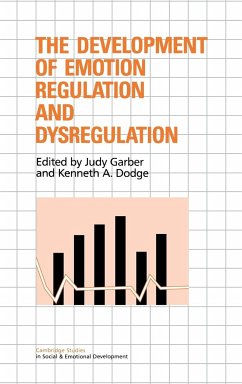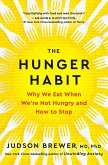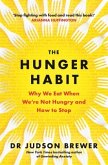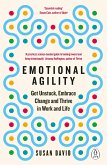Provides a developmental perspective of the regulation and dysregulation of emotion, in particular, how children learn about feelings and how they learn to deal with both positive and negative feelings. Emotion regulation involves the interaction of physical, behavioral, and cognitive processes in response to changes in one's emotional state. The changes can be brought on by factors internal to the individual (e.g. biological) or external (e.g. other people). Featuring contributions from leading researchers in developmental psychopathology, the volume concentrates on recent theories and data concerning the development of emotion regulation with an emphasis on both intrapersonal and interpersonal processes. Original conceptualizations of the reciprocal influences among the various response systems - neurophysiological-biochemical, behavioral-expressive, and subjective-experiential - are provided, and the individual chapters address both normal and psychopathological forms of emotion regulation, particularly depression and aggression, from infancy through adolescence. This book will appeal to specialists in developmental, clinical, and social psychology, psychiatry, education, and others interested in understanding the developmental processes involved in the regulation of emotion over the course of childhood.
Table of contents:
Preface; Part I. Introduction: 1. Domains of emotion regulation Kenneth A. Dodge and Judy Garber; Part II. Early Development: 2. Contributions from the study of high-risk populations to understanding the development of emotion regulation Dante Cicchetti, Jody Ganiban and Douglas Barnett; 3. Development of emotion expression during infancy: general course and patterns of individual difference Carol Malatesta-Magai; 4. Infant social referencing Tedra A. Walden; 5. Relationships, talk about feelings, and the development of affect regulation in early childhood Judy Dunn and Jane Brown; Part III. Physiological Regulation: 6. Vagal tone: an autonomic mediator of affect Stephen W. Porges; 7. Martial discord and child outcomes: a social psychophysiological approach Lynn Fainsilber Katz and John M. Gottman; Part IV. Cognitive Regulation: 8. Emotion and social information processing Kenneth A. Dodge; 9. Strategies and mechanisms for the personal and social control of emotion John C. Masters; 10. The regulation of sad affect: an information-processing perspective Judy Garber, Nancy Braafladt and Janice Zeman; Part V. Psychopathology: 11. Guilt and empathy: sex differences and implications for the development of depression Carolyn Zahn-Waxler, Pamela M. Cole and Karen Caplovitz Barrett; 12. Age changes in depressive disorders: some developmental considerations Michael Rutter; Part VI. Integration: 13. Emotions system functioning and emotion regulation Carroll E. Izard and R. Rogers Kobak; Author index; Subject index.
Hinweis: Dieser Artikel kann nur an eine deutsche Lieferadresse ausgeliefert werden.
Table of contents:
Preface; Part I. Introduction: 1. Domains of emotion regulation Kenneth A. Dodge and Judy Garber; Part II. Early Development: 2. Contributions from the study of high-risk populations to understanding the development of emotion regulation Dante Cicchetti, Jody Ganiban and Douglas Barnett; 3. Development of emotion expression during infancy: general course and patterns of individual difference Carol Malatesta-Magai; 4. Infant social referencing Tedra A. Walden; 5. Relationships, talk about feelings, and the development of affect regulation in early childhood Judy Dunn and Jane Brown; Part III. Physiological Regulation: 6. Vagal tone: an autonomic mediator of affect Stephen W. Porges; 7. Martial discord and child outcomes: a social psychophysiological approach Lynn Fainsilber Katz and John M. Gottman; Part IV. Cognitive Regulation: 8. Emotion and social information processing Kenneth A. Dodge; 9. Strategies and mechanisms for the personal and social control of emotion John C. Masters; 10. The regulation of sad affect: an information-processing perspective Judy Garber, Nancy Braafladt and Janice Zeman; Part V. Psychopathology: 11. Guilt and empathy: sex differences and implications for the development of depression Carolyn Zahn-Waxler, Pamela M. Cole and Karen Caplovitz Barrett; 12. Age changes in depressive disorders: some developmental considerations Michael Rutter; Part VI. Integration: 13. Emotions system functioning and emotion regulation Carroll E. Izard and R. Rogers Kobak; Author index; Subject index.
Hinweis: Dieser Artikel kann nur an eine deutsche Lieferadresse ausgeliefert werden.








